|
| Warning: The full synopsis contains "spoilers" which
describe key plot points. If you don't want to know the plot and outcome of this film then please
don't read any further. |
| All the World's a Stage |
|
|
 Begins beautifully with the curtain going up on a stage to reveal that the stage is in fact London - the bombed-out area of St. Paul's just after the war. We are immediately embroiled in the centre of intrigue as we witness the two central characters Jonathan Cooper (Richard Todd) and Eve Gill (Jane Wyman) discussing their situation in the midst of a car chase. Cooper begins to relate the story about Charlotte Inwood which takes us in to what has become the notorious false flashback scene (which Hitchcock described as the second greatest mistake of his career). Up until then the flashback was always used as a technique to reveal the truth; Hitchcock uses it to deceive his audience. Begins beautifully with the curtain going up on a stage to reveal that the stage is in fact London - the bombed-out area of St. Paul's just after the war. We are immediately embroiled in the centre of intrigue as we witness the two central characters Jonathan Cooper (Richard Todd) and Eve Gill (Jane Wyman) discussing their situation in the midst of a car chase. Cooper begins to relate the story about Charlotte Inwood which takes us in to what has become the notorious false flashback scene (which Hitchcock described as the second greatest mistake of his career). Up until then the flashback was always used as a technique to reveal the truth; Hitchcock uses it to deceive his audience.
The flashback has Charlotte Inwood, a stage chanteuse, turning up on Jonathan Cooper's doorstop in a blood-stained dress. She confesses to killing her husband in self-defence whilst he was hitting her. Cooper convinces her that everything will be alright but that she must go on stage that evening as if nothing has happened. With sophisticated emotional blackmail she convinces him to return to her flat and retrieve an alternative dress in which to perform. In a spontaneous moment he attempts to make the murder look as if it were the result of a bungled burglary. However, he is interrupted by a violent scream from the maid and flees. On returning with the dress Inwood suggests that he goes in to hiding and he also promises to dispose of her blood-stained dress; however, once she leaves for the theatre he seems to think more clearly and realises that the dress may actually be his only alibi. He decides to ring Miss Eve Gill, an acting friend, and is told by her mother that she is rehearsing at R.A.D.A.. The doorbell rings and he sees that it is the police; he invites them in and manages to flee in the police 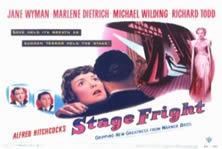 car with the blood-stained dress stuffed under his jumper. Jonathan Cooper succeeds in tracking Eve down at R.A.D.A. and they set off in her car. We have now returned to where the film originally began with the couple being pursued by the police. The pair manage to escape to the Commodore Gill's (Eve's father) cottage by the sea. car with the blood-stained dress stuffed under his jumper. Jonathan Cooper succeeds in tracking Eve down at R.A.D.A. and they set off in her car. We have now returned to where the film originally began with the couple being pursued by the police. The pair manage to escape to the Commodore Gill's (Eve's father) cottage by the sea. |
| The Commodore's Cottage |
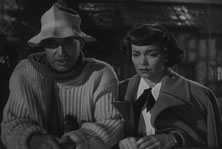 Commodore Gill calls the couple inside and, in typical Alastair fashion, proceeds to act with a kind of foolish wisdom. The Commodore believes that he is about to act like a fool and help them because foolishness is infectious (see Memorable Quotes 1 ). This is an extremely interesting speech and may well have originated from Alastair or, because James Bridie knew Alastair so well and was familiar with Alastair's ideas on the "qualified fool" (i.e. the fool who knows he is a fool), it may well have been inserted with Alastair in mind. Commodore Gill calls the couple inside and, in typical Alastair fashion, proceeds to act with a kind of foolish wisdom. The Commodore believes that he is about to act like a fool and help them because foolishness is infectious (see Memorable Quotes 1 ). This is an extremely interesting speech and may well have originated from Alastair or, because James Bridie knew Alastair so well and was familiar with Alastair's ideas on the "qualified fool" (i.e. the fool who knows he is a fool), it may well have been inserted with Alastair in mind.
It would seem that the news has broken and that the Commodore is aware that Cooper is a suspected murderer. Eve asks her father to take Cooper across the Channel to France. The Commodore, appropriately enough, compares Eve's situation to a stage play with plot, actors and costumes. He quickly identifies that the blood stains on the dress were smeared on deliberately and were not the result of a spontaneous assault. He is reluctant to take Cooper's story at face value and suspects that Charlotte Inwood may have calculatedly murdered her husband. He believes the dress is an important clue and although it grieves him he believes they should go to the police. When Eve and her father question Cooper, in an angered defence of Mrs. Inwood, he throws the dress into the fire.
It is this scene which realy lays down the foundations for the "theatre/acting" leitmotif.
The Commodore also (as was Hitchcock towards his daughter Patricia who appears in the film) gently cynical about his daughter's acting ambitions. He accuses Eve of treating her relationship with Jonathan, the boy she loves, like a "melodramatic play." "Everything seems a fine role when you're stage-struck," he says to her. If she is caught hiding a fugitive, he warns Eve, she will have a couple of years in prison to "meditate on the folly of transmuting melodrama into real life." ( Eve later confesses to detective Smith, "My father says I tend to over-dramatize everything.") When Eve, trying to gain her father's help in hiding Jonathen, says, with an appeal to her father's roguish nature, that he and Captain Kidd are her greatest heros, he admonishes her acting skills, "I'm not deceived. If there is one thing I can' t bear it's insincerity."
The Commodore's constant references to his daughter's tribulations as a kind of bad melodrama make him a pseudo-directorial mouthpiece of the film. He seems to stand back from the action as an author or critic, not a participant. To him go the self-reflective lines that Hitchcock seemed to take such pleasure in planting in each of his films. "Here you have a plot, an interesting cast, even a costume," he says, holding the bloodied dress that supposedly proves Charlotte Inwood murdered her husband. He tends to refer to the other characters in the movie in terms of film conventions. Eve is described as a potential "murderer's moll," and Cooper as "the man who came to dinner." He has an accordion strapped to him so that he can, as certain critics have commented, mock Eve's dramatics with musical flourishes. When she speaks of her love for Jonathan he plays saccharine love music but when she refers to Charlotte as an "evil spirit" he plays heavy-handed horror themes.
They each eventually retire to bed and the following morning Eve sneaks off early in an attempt to take on Charlotte Inwood. As she is getting in to her car she spies a note from her father reminding her that Mrs. Inwood is a dangerous woman and to be careful. He may be foolish but he is not stupid.
|
Inspector Smith |
|
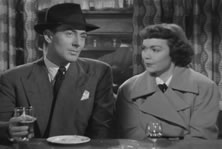 Eve returns to the scene of the crime in London and encounters a crowd outside the Inwood house. In an attempt to discover what is happening she follows Inspector "Ordinary" Smith (Michael Wilding) into the Shepherd's public house acting the role of a tired and distressed woman. Inspector Smith eventually takes the bait. They talk and Eve tells him of her only acting role to-date - the fourth Deadly Sin (this is Avarice; Bridie may have missed a trick here and the first Deadly Sin is Pride which would seem to be more appropriate for Eve). The interplay between Wyman and Wilding in this scene is delightful. The couple observe the Inwood's maid talking about her discovery of the body in a much too public way Eve returns to the scene of the crime in London and encounters a crowd outside the Inwood house. In an attempt to discover what is happening she follows Inspector "Ordinary" Smith (Michael Wilding) into the Shepherd's public house acting the role of a tired and distressed woman. Inspector Smith eventually takes the bait. They talk and Eve tells him of her only acting role to-date - the fourth Deadly Sin (this is Avarice; Bridie may have missed a trick here and the first Deadly Sin is Pride which would seem to be more appropriate for Eve). The interplay between Wyman and Wilding in this scene is delightful. The couple observe the Inwood's maid talking about her discovery of the body in a much too public way
As Eve leaves the bar, Hitchcock focuses on someoff-screen dialogue between the coarse Nelly Goode, who has sidled up to the bar, and a barfly who had earlier made a pass at Eve. We see Eve happily exiting with her new beau, but we hear (Hitchcock being fond of this kind of asynchronous dialogue) the barfly complimenting Nelly, who has just wangled a drink out of him. "You don't miss a trick do you, Nelly. You're always on the make." Seeing Eve, but hearing Nelly makes the barfly's words seem to apply to Eve as well as Nelly. Eve certainly thinks they apply to her. She freezes for a moment, her smile quickly fading. She had intended to use her acting skills to help her innocent boyfriend. Instead, she had picked up a new boyfriend. The barfly's words ring with accusations of promiscuity and betrayal, and Eve seems to recognize that the freedoms inherent in pretending to be someone you are not can be pretty heady.
Inspector Smith drops Eve off home and she arranges for him to come to dinner the following afternoon. |
| The Shepherd's |
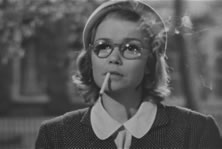 The scene now returns The Shepherd's public house with Eve, pretending to be a reporter, attempting to persuade the Inwood's maid (for the appropriate remuneration) to feign illness so that Eve, pretending to be her cousin, could take over her duties in an attempt to move close to Charlotte Inwood and discover the truth about the murder. As well as being the maid her duties will also include acting as Mrs. Inwood's dresser for the stage. The maid eventually agrees and we cut to Eve using her acting skills to disguise herself as a "common" cockney maid. She rehearses by trying to fool her mother who, rather worryingly, sees right through her disguise. Stage Fright, no doubt owing to one of its primary themes, is particularly focused in on disguises, perceptions, mirrors, eyeglasses and cigarettes The scene now returns The Shepherd's public house with Eve, pretending to be a reporter, attempting to persuade the Inwood's maid (for the appropriate remuneration) to feign illness so that Eve, pretending to be her cousin, could take over her duties in an attempt to move close to Charlotte Inwood and discover the truth about the murder. As well as being the maid her duties will also include acting as Mrs. Inwood's dresser for the stage. The maid eventually agrees and we cut to Eve using her acting skills to disguise herself as a "common" cockney maid. She rehearses by trying to fool her mother who, rather worryingly, sees right through her disguise. Stage Fright, no doubt owing to one of its primary themes, is particularly focused in on disguises, perceptions, mirrors, eyeglasses and cigarettes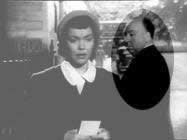 and finds the central character, Eve, taking on the guise of a Dorothy Parker-esque reporter at one moment and a maid infiltrating a fatale's lair at another. As Eve, pretending to be Doris, travels to meet Mrs. Inwood we see the usual cameo role from Hitchcock as he passes Wyman in the street and stares at her quizzically as she rehearses her south London accent. and finds the central character, Eve, taking on the guise of a Dorothy Parker-esque reporter at one moment and a maid infiltrating a fatale's lair at another. As Eve, pretending to be Doris, travels to meet Mrs. Inwood we see the usual cameo role from Hitchcock as he passes Wyman in the street and stares at her quizzically as she rehearses her south London accent.
|
| Doris Dinsdale and the Mourner |
 As Eve arrives at the Inwood house, she has a narrow squeak where she nearly bumps in to Inspector Smith as she dresses Charlotte Inwood in mourning attire; Inwood's general behaviour, however, is not that of a woman who is mourning the loss of her husband (see Memorable Quotes 4 ). Eve now overhears Mrs. Inwood telling the Inspector that Cooper is responsible for the murder. As Eve arrives at the Inwood house, she has a narrow squeak where she nearly bumps in to Inspector Smith as she dresses Charlotte Inwood in mourning attire; Inwood's general behaviour, however, is not that of a woman who is mourning the loss of her husband (see Memorable Quotes 4 ). Eve now overhears Mrs. Inwood telling the Inspector that Cooper is responsible for the murder.
When Eve introduces herself as 'Doris Dinsdale', she receives the reprimand, 'Not so loud, dear', as if she were back at the Royal Academy of Dramatic Art, rehearsing. But Charlotte soon finds her a part, telling her to be ready to introduce the doctor when Charlotte gives her a cue by coughing. During this scene, Charlotte keeps forgetting her new maid's name, despite some prompting from Eve herself. And when, as she is bidden, Eve goes into the next room to await the doctor's arrival, the ensuing action is filmed as if from the wings of a theatre. There, Eve hovers as if she were suffering from the titular stage fright, for she's afraid of being recognised by Detective Smith.
 The following scene sees Eve arriving home from her new job only to find Inspector Smith having tea with her mother; this is the pre-arranged tea from the day before. The "afternoon tea" is a delightful scene with the Commodore and his wife exchanging barbed married comments (see Memorable Quotes 5 ). Eccentric parents are a common theme in Hitchcock films as we see in North By Northwest and, in extremis, Psycho). During the exchanges the Commodore, in coded language (referring to Cooper as if he were a dog), informs Eve that he has taken Cooper on the promised sea voyage to France. It is at this get-together that Inspector "Ordinary" Smith seems to win Eve's heart by playing a romantic piano piece. The following scene sees Eve arriving home from her new job only to find Inspector Smith having tea with her mother; this is the pre-arranged tea from the day before. The "afternoon tea" is a delightful scene with the Commodore and his wife exchanging barbed married comments (see Memorable Quotes 5 ). Eccentric parents are a common theme in Hitchcock films as we see in North By Northwest and, in extremis, Psycho). During the exchanges the Commodore, in coded language (referring to Cooper as if he were a dog), informs Eve that he has taken Cooper on the promised sea voyage to France. It is at this get-together that Inspector "Ordinary" Smith seems to win Eve's heart by playing a romantic piano piece.
|
| The Laziest Gal In Town |
 Cut to the theatre and Charlotte Inwood (Marlene Dietrich) . In sultry fashion, Dietrich performs a couple of numbers including an original Cole Porter song, "The Laziest Gal In Town" . Halfway through the song she is only slightly disconcerted to discover that Cooper is watching her from the wings. As Cooper and Inwood discuss their next moves Eve is listening at the stage door. Cooper is disconcerted that Charlotte Inwood would have him disappear from the scene until the murder blows over. In an attempt to gain mastery over Charlotte, Cooper lies that he has not destroyed the dress. Inwood returns to her performance on the stage and the police, following a tip-off, move towards her dressing room to accost Cooper. It is only Eve's deliberately loud dialogue with the Inspector that allows Cooper to escape. Cut to the theatre and Charlotte Inwood (Marlene Dietrich) . In sultry fashion, Dietrich performs a couple of numbers including an original Cole Porter song, "The Laziest Gal In Town" . Halfway through the song she is only slightly disconcerted to discover that Cooper is watching her from the wings. As Cooper and Inwood discuss their next moves Eve is listening at the stage door. Cooper is disconcerted that Charlotte Inwood would have him disappear from the scene until the murder blows over. In an attempt to gain mastery over Charlotte, Cooper lies that he has not destroyed the dress. Inwood returns to her performance on the stage and the police, following a tip-off, move towards her dressing room to accost Cooper. It is only Eve's deliberately loud dialogue with the Inspector that allows Cooper to escape.
Following the performance Eve returns home with her father and she informs him of a plan to invite her Inspector Smith to
the Theatrical Garden Party so that she can put him on the scent of Mrs. Inwood who will be performing there. They enter the house only to discover Cooper in conversation  with her mother and requiring a place to stay for the night. The plot is advanced, with Eve trying to place suspicion on Charlotte Inwood, as "Ordinary Smith" and Eve make their way to the Garden Party in a taxi. We are treated to another wonderful scene as the couple stare into each other's eyes for an eternity, whilst Eve continues to discuss the murder, before they eventually kiss. with her mother and requiring a place to stay for the night. The plot is advanced, with Eve trying to place suspicion on Charlotte Inwood, as "Ordinary Smith" and Eve make their way to the Garden Party in a taxi. We are treated to another wonderful scene as the couple stare into each other's eyes for an eternity, whilst Eve continues to discuss the murder, before they eventually kiss.
|
| The Theatrical Garden Party |
 As could only be expected for a garden party it is pouring with rain. Eve, spots Nellie Goode and, leaves Inspector Smith in the hands of her R.A.D.A. friends who include Chubby Bannister (played by Hitchcock's daughter, Patricia) so she can find out what she wants. What she wants is more money and to tell her that Mrs. Inwood is expecting her, as dresser, for the forthcoming garden party performance. Nelly telephones her father to meet her with the additional money. The Commodore, more often than any other character in the film, seems to speak for Hitchcock. It is striking that in the film that most strongly alludes to his daughter's life, Hitchcock creates his strongest father-daughter relationship. The Commodore teases Eve at the garden party, suggesting that she confront Charlotte Inwood in a manner of high drama. "You call yourself an actress. There's your big scene if you have the pluck to take it ... All you have to do is rush in there and say, 'Stop, that woman is a murderess.' And then she'll say, 'How dare you!' And then you'll say, 'I'll dare and dare again.'" He seems to have a grand time mocking not only Eve's acting (as Hitchcock meant to tease Pat about hers), but mocking the film and its dependence on melodrama as well. Alastair, as the Commodore, seems never to be able to buy the reality of what is happening around him, as if he, alone, had special knowledge that they were all just characters trapped in a melodrama (this is not an unfamiliar role for Alastair - see "An Inspector Calls", "School For Scoundrels"). A subordinate theme that spans the entire film is the pretence of the stage and roles people hide behind, on stage and off. Jane Wyman plays a character who As could only be expected for a garden party it is pouring with rain. Eve, spots Nellie Goode and, leaves Inspector Smith in the hands of her R.A.D.A. friends who include Chubby Bannister (played by Hitchcock's daughter, Patricia) so she can find out what she wants. What she wants is more money and to tell her that Mrs. Inwood is expecting her, as dresser, for the forthcoming garden party performance. Nelly telephones her father to meet her with the additional money. The Commodore, more often than any other character in the film, seems to speak for Hitchcock. It is striking that in the film that most strongly alludes to his daughter's life, Hitchcock creates his strongest father-daughter relationship. The Commodore teases Eve at the garden party, suggesting that she confront Charlotte Inwood in a manner of high drama. "You call yourself an actress. There's your big scene if you have the pluck to take it ... All you have to do is rush in there and say, 'Stop, that woman is a murderess.' And then she'll say, 'How dare you!' And then you'll say, 'I'll dare and dare again.'" He seems to have a grand time mocking not only Eve's acting (as Hitchcock meant to tease Pat about hers), but mocking the film and its dependence on melodrama as well. Alastair, as the Commodore, seems never to be able to buy the reality of what is happening around him, as if he, alone, had special knowledge that they were all just characters trapped in a melodrama (this is not an unfamiliar role for Alastair - see "An Inspector Calls", "School For Scoundrels"). A subordinate theme that spans the entire film is the pretence of the stage and roles people hide behind, on stage and off. Jane Wyman plays a character who  wants to be an actress on stage, yet she is forced into circumstances where she must act convincingly in real life. Richard Todd must maintain an image of innocence so that Wyman will help keep him from the police. Marlene Dietrich plays an actress, and one is never sure when she is acting her ordinary self offstage or putting on an act. wants to be an actress on stage, yet she is forced into circumstances where she must act convincingly in real life. Richard Todd must maintain an image of innocence so that Wyman will help keep him from the police. Marlene Dietrich plays an actress, and one is never sure when she is acting her ordinary self offstage or putting on an act.
The Commodore has a plan to confront Mrs. Inwood and tells his daughter to make sure she gets Smith into the tent to watch Charlotte Inwood sing. Now we have yet another delightful scene between Alastair and Joyce Grenfell. As part of the Commodore's plan he needs to obtain one of the prize dolls from the shooting gallery. He attempts to buy one but Lucky Ducks wants four pounds (for the orphans). Gill has already been cleaned out by Nellie Goode and therefore has to attempt to win a doll. The Commodore hits a duck first time and claims his prize doll but a large bully of a man claims the duck as his forcing Gill to reply "Good shot, Sir". Gill now sneakily moves besides a "small" crack-shot and fires at the same time; he then uses his height to bully his way to the winning shot and claiming the prize doll. Alastair now  acts delightfully as he has to cut his own hand (and nearly faints) to smear on the doll's dress to replicate the murder dress. He then persuades a small boy to walk on to the garden party stage and present the doll to Charlotte Inwood causing her to abruptly end her performance. Doris is called to attend Mrs. Inwood. To maintain her charade as Doris Eve must walk forward and so Inspector Smith realises the truth. acts delightfully as he has to cut his own hand (and nearly faints) to smear on the doll's dress to replicate the murder dress. He then persuades a small boy to walk on to the garden party stage and present the doll to Charlotte Inwood causing her to abruptly end her performance. Doris is called to attend Mrs. Inwood. To maintain her charade as Doris Eve must walk forward and so Inspector Smith realises the truth.
The scene now cuts to the house of Eve's mother with Eve and her father explaining to Cooper how they had made a quick exit from the garden party. Inspector Smith, however, is downstairs. In spite of his anger at Eve's acting and interference, "Ordinary" Smith is sufficiently smitten with Eve to want to help resolve the situation for the Gill family. The love scene is interrupted by Eve's father who remarks amusingly upon their precarious situation with the law and possible arrest (see Memorable Quotes 7 ). Mr. Smith seems reluctantly willing to endorse another idea of the Commodore who suggests that Eve (as Doris) should pretend to blackmail Mrs. Inwood over the dress.
 Eve lures Mrs. Inwood into a dressing room that, with Smith and the Commodore's assistance, has been rigged with a microphone. Mrs. Inwood still denies murdering her husband but seems to admit complicity in Cooper's murder of her husband. As Smith arrests Mrs. Inwood the Commodore tenderly applauds his daughter's performance as she breaks down in tears. Inspector Smith's men now walk on to the scene with the arrested Cooper who immediately breaks free again. Cooper manages to throw the police off his trail and once again seeks the assistance of Eve. We are now witness to a conversation between Smith and the Commodore in which Smith informs Gill that Cooper has killed before. Eve lures Mrs. Inwood into a dressing room that, with Smith and the Commodore's assistance, has been rigged with a microphone. Mrs. Inwood still denies murdering her husband but seems to admit complicity in Cooper's murder of her husband. As Smith arrests Mrs. Inwood the Commodore tenderly applauds his daughter's performance as she breaks down in tears. Inspector Smith's men now walk on to the scene with the arrested Cooper who immediately breaks free again. Cooper manages to throw the police off his trail and once again seeks the assistance of Eve. We are now witness to a conversation between Smith and the Commodore in which Smith informs Gill that Cooper has killed before.
Cooper and Eve are hiding beneath the stage and Cooper admits that he had been goaded in to the murder by Charlotte Inwood. Alarmingly, Cooper then admits that he has an uncontrollable temper which is why he has previously killed another girl. Cooper believes he will be hanged. However, if he killed for a third time, without a motive, then he may escape with a plea of insanity. Eve's final bit of acting in this film occurs when she pretends to lead Jonathan to safety only to lock him out of the below stage space and scream to the authorities where he is, thus leading him to a violent death. (In a typical Hitchcock note she screams right before a sign that admonishes those below stage to be quiet during a performance. One final joke about overacting?) By this time Eve has betrayed a good many people who trusted her - "Ordinary" Smith, Charlotte Inwood and Jonathan. Her morality is ambiguous. Eve has, of course, been doing the right thing in pursuing justice, yet she has betrayed people just the same.
It is here we finally see the significance of the film's title, which does not, it seem, refer to the fear of acting. On the contrary, everyone throughout the film has been more than willing to assume a role. On the one hand the title may well be a Hitchcock joke, being humorously literal in its allusion to Eve's fear as Johnny threatens Eve's life under the stage of the Royal Academy of Art theater. It  may also refer to the more subtle fear Eve may now have of acting now she understands that it can be a great deal more dangerous than she had originally thought.
It could also refer to Jonathan's stage fright. After all, it is Jonathan Cooper who is, in the end, on stage surrounded by authorities, the only character to literally experience fear on the stage. may also refer to the more subtle fear Eve may now have of acting now she understands that it can be a great deal more dangerous than she had originally thought.
It could also refer to Jonathan's stage fright. After all, it is Jonathan Cooper who is, in the end, on stage surrounded by authorities, the only character to literally experience fear on the stage.
As Cooper runs from the police, the stage-hand attempts to block his exit by lowering the stage safety curtain. However, Cooper slips and, with a certain degree of irony, is bisected by the heavy iron curtain. This is the very same curtain we see raised at the start of the film. Inspector "Ordinary" Smith carefully leads Eve away from the stage.
|
|
|
Eve: Do you think I've behaved like a
fool?
Commodore: On the whole I think so. But I think your boyfriend has
behaved like a fool. And I've a strong premonition that I'm going to behave like a fool. It's
infectious.
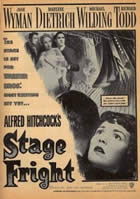
Commodore: Particularly with my
reputation. Eve:
There's nothing the matter with your reputation.
Commodore: Well indeed, I rather flattered myself that there was.
Commodore: Ahh, but I never hoped to be appreciated. Yes, your mother cured me of that.

Mrs Inwood: This is very nice, if you can call mourning nice. (Pointing to her bust) But, er, isn't there some way we could let it plunge a little in front.
Commodore: Good, good, good. Anyone else coming? I mean, going to be a party? I'm passionately fond of parties.
Mrs Gill: No. There's no one else coming, and
you weren't invited.
Commodore: Wasn't I? Oh, an oversight. Ah, but I forgive you.
Forgiveness, Mr. Smith. The secret of a happy married life. That and good long stretches of the absence
that makes the heart grow fonder.

Eve Gill: I'm afraid the murderer might come here, Madam. Might get into the dressing room. Might even murder me, Madam. I'm surprised you're not a bit
afraid yourself.
Mrs. Inwood: The theatre is the last place he would be seen. Now stop acting like a silly schoolgirl, the only murderer here is the orchestra leader!

Commodore: Good evening, Mr. Smith. Do I hear the muted clanking of chains?

Eve: It'll be one woman to another.
Commodore: Yes. An impressive situation at any time. |


